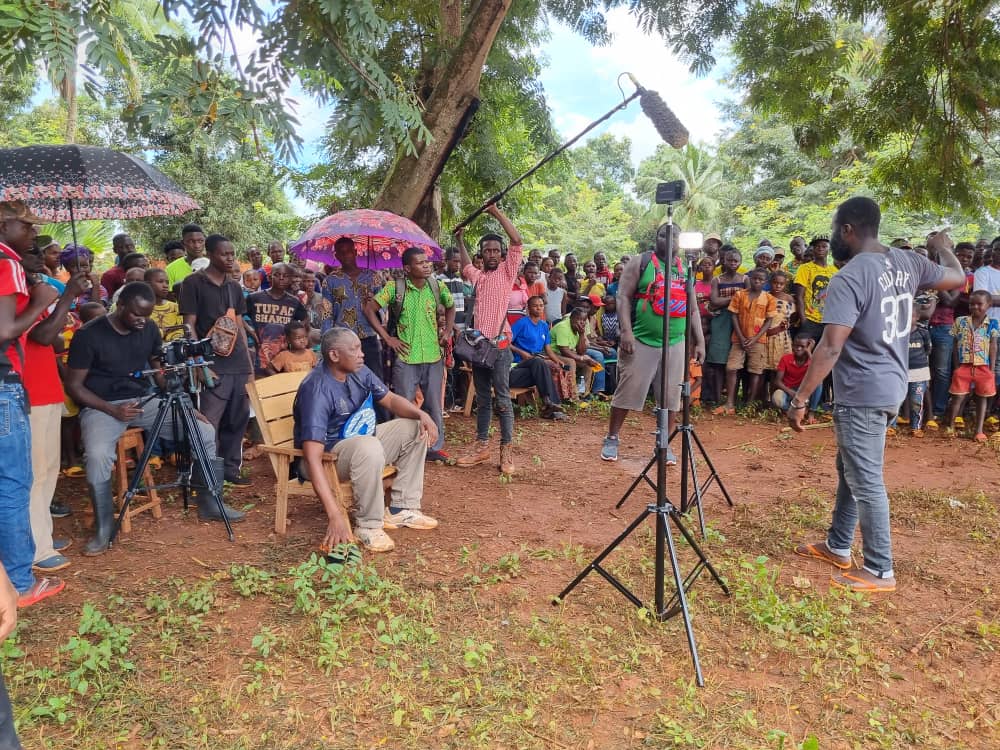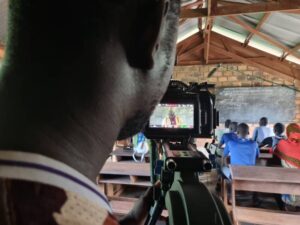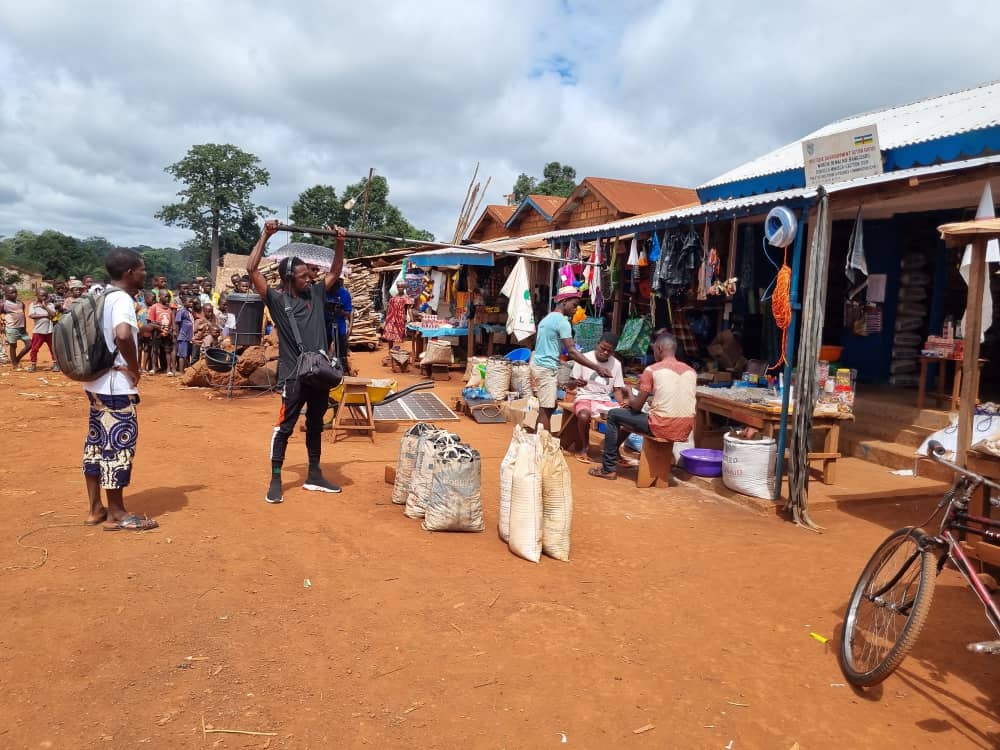In 2021, Invisible Children partnered with the United States Agency for International Development (USAID) to implement USAID’s People to People (P2P) Activity in the Central African Republic (CAR), a multi-year initiative that equips Central African youth peacebuilders with the skills needed to reduce intercommunal tension and armed group violence in eastern CAR.
A key component of the P2P peacebuilding model is a three-episode Mobile Cinema project called E Ma Tere, meaning “to understand one another” in the national language of CAR, Sango. Invisible Children and its local partners have shared these episodes with nearly 9,000 Central Africans so far in screenings that are accompanied by facilitated dialogues that open up space for Central Africans to voice their ideas for how to reinforce social cohesion.
For over two decades, Invisible Children has been developing innovative solutions to peacebuilding and violence prevention, including harnessing the power of story. In 2013 Invisible Children launched its Mobile Cinema Program in Central Africa and is thrilled to have recently released this most recent film series in partnership with USAID and Central African partners.

Filming of E Ma Tere
A Rising Tide of Armed Group and Intercommunal Violence
Since 2017, armed group violence and intercommunal violence have worsened considerably in eastern CAR’s Mbomou and Haut Mbomou prefectures (known as the Mbomous region). These prefectures are home to a diverse population that shares close economic and cultural ties that have been a source of social cohesion. Though the conflict is rooted in control over resources and political power, it has reinforced divisions between identity groups, including Azande and Peuhl ethnic groups, farmers and pastoralists, and Christians and Muslims. In particular, armed groups frequently recruit from specific ethnic, livelihood, and religious groups and target civilians of other such groups, further reinforcing such divisions. In total, the Invisible Children-supported Early Warning System has documented more than 500 incidents of armed group or intercommunal violence in the Mbomous region since 2017.
The P2P model
In close collaboration with Central African civil society organizations, including OAZ Entertainment (OAZ) and Femmes Hommes Action Plus (FHAP), P2P is reinforcing and leveraging existing peacebuilding efforts in the Mbomous region of eastern CAR by strengthening the capacity of at least 420 female and male youth peacebuilders in more than a dozen communities.
These local peacebuilders are implementing sensitization and peace education through various youth-oriented initiatives. To date, more than 650 young people have participated in Village Savings and Loan Associations (VSLAs), while dozens more have completed vocational training to become tailors, carpenters, and mechanics. In addition, more than 34,500 people have participated in events designed to build mass support for peace and reconciliation, including community-building activities such as soccer and basketball.

Filming of E Ma Tere
A New Mobile Cinema Project: E Ma Tere
A key element of the P2P peacebuilding work is a new Mobile Cinema project called E Ma Tere. It is a three-episode mini-series that was written, produced, and performed entirely by Central African artists, filmmakers, and community members. It tells the story of a Central African community grappling with reconciliation, resilience, and hope in the aftermath of conflict and displacement. Through diverse characters and exploring their struggles, the series challenges biases and encourages audience members to stand up against hate speech, gender-based violence (GBV), and armed group recruitment. Through powerful storytelling and local perspectives, the series aims to foster dialogue, empathy, and understanding among diverse communities, including Christians and Muslims.
Immediately following screenings, communities are invited to participate in facilitated dialogues that explore these critical themes and help strengthen social cohesion. These post-screening dialogues also provide communities with the opportunity to discuss and develop solutions to the specific dynamics and challenges they experience locally, and promote a shared vision of peace and unity in their communities.

Filming of E Ma Tere
Invisible Children and our local partners initially screened the E Ma Tere series in the Central African towns of Bangassou and Zemio to a diverse audience of an estimated 1,500 community members, including 700 women, 300 children, and 500 men. The series then officially premiered on September 30, 2023, in the capital of Bangui to 350 community members, representatives from Central African civil society organizations, the CAR government, the US Embassy, and Central African community leaders, including traditional chiefs. In total, Invisible Children and its partners have organized 36 screenings and dialogues in which more than 8,800 Central Africans have participated.
E Ma Tere’s Impact & the Power of Story
“After watching the films, I noticed a remarkable change in how our community views Peuhls. The narratives presented in the Mobile Cinema series conveyed messages of tolerance, unity, and shared humanity. As a result, there has been a shift towards greater acceptance and respect towards our Peuhl neighbors. The films served as a powerful tool for promoting mutual understanding and harmony among different ethnic groups in our community.”
– community member following a screening in Bema
As Invisible Children and our local partners continue to screen the E Ma Tere films in communities throughout the Mbomous region, the program is already positively impacting local dynamics. Community perceptions have notably shifted in target areas such as the towns of Bakouma and Pombolo, where minority ethnic groups, especially the Peuhl, are now more accepted in public spaces and cooperation between Christian and Muslim populations within these communities has increased. Given the impact of the program, local authorities in neighboring towns have been requesting screenings of the E Ma Tere films in their communities specifically to promote social cohesion and peacebuilding.
Through the power of story, E Ma Tere shifts individual and communal biases and behaviors, ultimately catalyzing collective action for peacebuilding in CAR. For this reason, it is a critical component of the USAID’s P2P Activity efforts to peacefully counteract local hate speech, reduce intercommunal tensions, and create more opportunities for at-risk youth to develop sustainable livelihoods.
The E Ma Tere Series
About Invisible Children
Invisible Children was founded in 2004 to help end two decades of mass violence and child abductions by the Lord’s Resistance Army (LRA). Today, with the support of partners and friends like you, we are leveraging the expertise and relationships we have built to increase our impact. Our community-based programs and conflict analysis help local peacebuilders develop innovative methods to prevent violence and build sustainable peace in the Democratic Republic of Congo, South Sudan, and the Central African Republic.
Think people should hear about this?